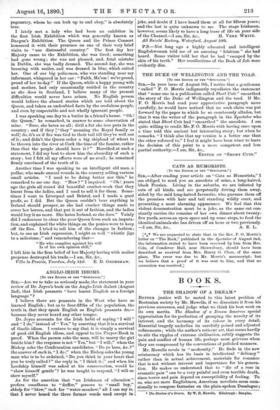ANGLO-IRISH IDIOMS.
[To THE EDITOR OF THE " SPECTATOR."] SIR,—Are we to take as seriously made, the statement in your review of Dr. Joyce's book on the Anglo-Irish dialect (August 2nd), that Irish peasants " have learnt English as a foreign language "?
I believe there are peasants in the West who have so learned English ; but as to four-fifths of the population, the truth is, that they speak English as English peasants do,— because they never heard any other tongue.
Dr. Joyce accounts for the Irish habit of saying "I will" and " I do," instead of " Yes," by asserting that it is a survival of Gaelic idiom. I venture to say that it is simply a survival of good old English idiom, and appeal to the Prayer-Book in proof. When the parson asks the man, will he marry the girl beside him ? the response is not " Yes," but " I will;" when the Bishop asks the Confirmation candidates, "Do ye here, &e. ?" the answer of each is, " I do ;" when the Bishop asks the young man who is to be ordained, " Do you think in your heart that you be truly called 13" the reply is, " I think it ;" and when his Lordship himself was asked at his consecration, would he " show himself gentle "? he was taught to respond, "I will so show myself."
As for the assertion that " an Irishman of education " prefers omadhaun to " differ," gossoon to " small boy," shke42 for "blow," inch for "water-meadow," all I can say is, that I never heard the three former words used except in
joke, and doubt if I have heard them at all for fifteen years; and the last is quite unknown to me. The stage Irishman, however, seems likely to have a long lease of life on your side
P.S.—Not long ago a highly educated and intelligent Englishwoman told me of an amusing " Irishism " she had heard. Some visitor told her that he had " escaped by the skin of his teeth." Her recollections of the Book of Job were evidently dim.


































 Previous page
Previous page